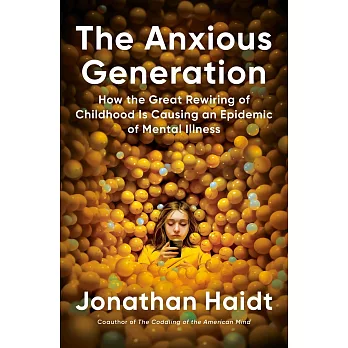心理學暢銷經典《象與騎象人》作者、社會心理學博士強納森.海德,在本書全面檢視智慧型手機、網路與社群,危害心理健康的公衛議題,呼籲各方正視青少年逐步惡化的健康危機。
2010年之前,青少年心理健康指標提升到不錯的水準,並維持穩定。然而,近十幾年來青少年心理指標不健康的人數,卻快速攀升到兩倍之多,當今的青少年堪稱是「焦慮世代」,飽受憂鬱、焦慮、自傷和自殺傾向所苦,造成這項公共衛生危機的源頭,是什麼?
社會心理學博士強納森.海德從童年的本質談起,說明兒童期的遊戲、青少年期的獨立探索經驗,如何幫助我們逐漸成熟發展,邁入成年階段。然而,自1980年起,隨著社會型態的改變,兒童能夠無拘無束遊戲的時間就日漸減少、緩步下滑;2010年後,網路和智慧型手機的普及更是徹底改造了孩子們的童年,衍伸出睡眠和注意力不足、網路成癮、無止境社會比較、完美主義等問題……更危及到兒童及青少年的社交、腦神經發展。當青少年從現實生活,退縮到螢幕後的虛擬世界,缺乏實際社交和獨立探索經驗,災難性的後果不僅影響個人發展,也將衝擊家庭和社會。
《焦慮世代》(The Anxious Generation)敲響警鐘,並提出實際改善方法,呼籲父母、教師、學校、科技公司和政府聯合行動,降低青少年的焦慮感,讓童年恢復其應有的樣貌。(文/博客來編譯)
THE INSTANT #1 NEW YORK TIMES BESTSELLER - A must-read for all parents: the generation-defining investigation into the collapse of youth mental health in the era of smartphones, social media, and big tech--and a plan for a healthier, freer childhood.
"Erudite, engaging, combative, crusading." --New York Times Book Review (Editors’ Choice) "Words that chill the parental heart... thanks to Mr. Haidt, we can glimpse the true horror of what happened not only in the U.S. but also elsewhere in the English-speaking world... lucid, memorable... galvanizing." --Wall Street Journal"[An] important new book... The shift in kids’ energy and attention from the physical world to the virtual one, Haidt shows, has been catastrophic, especially for girls." --Michelle Goldberg, The New York TimesAfter more than a decade of stability or improvement, the mental health of adolescents plunged in the early 2010s. Rates of depression, anxiety, self-harm, and suicide rose sharply, more than doubling on many measures. Why? In The Anxious Generation, social psychologist Jonathan Haidt lays out the facts about the epidemic of teen mental illness that hit many countries at the same time. He then investigates the nature of childhood, including why children need play and independent exploration to mature into competent, thriving adults. Haidt shows how the "play-based childhood" began to decline in the 1980s, and how it was finally wiped out by the arrival of the "phone-based childhood" in the early 2010s. He presents more than a dozen mechanisms by which this "great rewiring of childhood" has interfered with children’s social and neurological development, covering everything from sleep deprivation to attention fragmentation, addiction, loneliness, social contagion, social comparison, and perfectionism. He explains why social media damages girls more than boys and why boys have been withdrawing from the real world into the virtual world, with disastrous consequences for themselves, their families, and their societies. Most important, Haidt issues a clear call to action. He diagnoses the "collective action problems" that trap us, and then proposes four simple rules that might set us free. He describes steps that parents, teachers, schools, tech companies, and governments can take to end the epidemic of mental illness and restore a more humane childhood. Haidt has spent his career speaking truth backed by data in the most difficult landscapes--communities polarized by politics and religion, campuses battling culture wars, and now the public health emergency faced by Gen Z. We cannot afford to ignore his findings about protecting our children--and ourselves--from the psychological damage of a phone-based life.


 天天爆殺
天天爆殺  今日66折
今日66折 


























 博客來
博客來 博客來
博客來 博客來
博客來 博客來
博客來 博客來
博客來